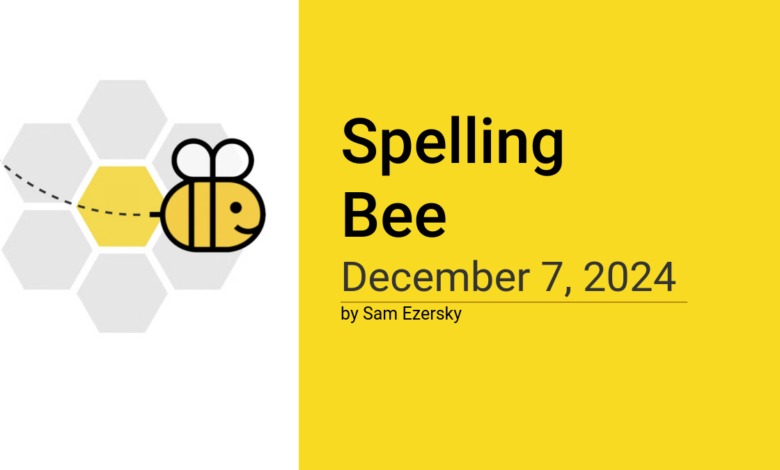Today’s Spelling Bee Answers: Your Ultimate Guide to Success

Introduction
Spelling bees are a time-honored tradition that has inspired children, parents, and educators alike. These competitions help foster a love for language, vocabulary, and memorization, all while pushing students to test their knowledge and skills in front of an audience. Whether you are a participant, a parent, or simply a spectator, understanding the intricacies of a spelling bee can enhance the experience.
In this article, we will delve into today’s spelling bee answers, offering insights into the event, the words used, and how participants prepared for this challenging test. By the end of this guide, you’ll be armed with knowledge to help future contestants succeed in upcoming spelling bees.
1. Overview of Today’s Spelling Bee
1.1 Event Details
Today’s spelling bee marks another exciting chapter in a tradition that spans decades. The event was held today at a local venue, but it’s important to note that with the rise of virtual competitions, many spelling bees are now being hosted online. This particular event featured students from all across the country, with varying levels of experience and preparation. Participants, ranging from elementary to high school students, showcased their spelling prowess, making it a truly competitive and engaging experience for everyone involved.
Spelling bees like today’s aren’t just competitions – they are learning experiences that allow contestants to push the limits of their vocabulary knowledge. The focus of today’s event was on not only how well participants could spell words but also their ability to think critically and stay calm under pressure. As the event unfolded, viewers could see participants growing in confidence, tackling each round with determination.
1.2 Format of the Competition

The format of a typical spelling bee, including today’s event, follows a structured process designed to test each contestant’s knowledge of words in increasing levels of difficulty. Contestants are given words to spell, one at a time, with each word increasing in complexity as they progress through the rounds. If a contestant spells a word correctly, they continue to the next round. However, if they misspell a word, they are eliminated from the competition.
Today’s competition saw participants spelling words from a variety of categories: common words, scientific terms, and words with complex origins. Some words had multiple syllables, requiring the spellers to not only know the correct spelling but also understand its origin and pronunciation.
1.3 Common Challenges in Spelling Bees
Spelling bees can be daunting, especially when faced with difficult or unfamiliar words. One of the most common challenges contestants face is nerves. The pressure of performing in front of an audience or in a high-stakes environment can make even the most prepared student second-guess their spelling. Another difficulty is words that have tricky or silent letters, such as “colonel” or “pneumonia.” These words often trip up even the most practiced spellers.
To overcome these challenges, it’s essential for participants to develop mental toughness and preparation strategies. Many successful spellers recommend practicing with a variety of word types, using mnemonic devices, and studying word origins.
2. Today’s Spelling Bee Word List
2.1 Easy Words
Although spelling bees are often associated with challenging words, many competitions, including today’s, start with easier words designed to build confidence and get participants into the rhythm of the competition. Words such as “apple,” “bicycle,” and “wonder” are commonly used in the early rounds. These words are straightforward in their today’s spelling bee answers and offer spellers the chance to warm up before tackling more complex challenges.
The easy words are also designed to help participants build confidence, allowing them to gain momentum. For younger participants, spelling easy words correctly can be a confidence booster, giving them the courage to face the more difficult rounds ahead. One trick to succeeding with these easier words is making sure you understand the phonetic components of the word and practicing by repeating it aloud.
2.2 Intermediate Words
As the competition progresses, the words become more challenging. Today’s spelling bee included intermediate words that required participants to demonstrate a higher level of vocabulary comprehension. Words like “embarrassment,” “chocolate,” and “gracious” were featured in the middle rounds. These words often involve double letters, tricky consonant combinations, or silent letters, making them more difficult to spell.
A key aspect of spelling more complex words is learning to recognize common spelling patterns. For example, the double “r” in “embarrassment” or the silent “ch” in “chocolate” is something many spellers need to be aware of. Practicing similar words that share common roots or sounds can significantly improve a contestant’s chances of success in these intermediate rounds.
2.3 Hard Words
The most difficult words in today’s spelling bee were designed to challenge even the most experienced spellers. Words like “onomatopoeia,” “cacophony,” and “antidisestablishmentarianism” made an appearance, testing participants’ endurance and knowledge. These words often come from specialized fields such as science, medicine, or literature and require participants to have a deep understanding of etymology.
Preparing for such difficult words involves more than just rote memorization. Contestants who performed well in the hardest rounds had practiced studying word roots and affixes, understanding how they contribute to a word’s meaning and spelling. Breaking down a long word into smaller, manageable parts can also help contestants manage complex words and boost their confidence.
3. Answers to Today’s Spelling Bee
3.1 Official Answers from the Event
The answers to today’s spelling bee showcased impressive spelling abilities, with the winners successfully tackling even the most complex words. Some of the correctly spelled words included “ephemeral,” “ludicrous,” and “prestidigitation.” Each contestant displayed remarkable attention to detail, as they needed to recall not only how the words were spelled but also their meanings and origins.
The final round of the competition brought some truly difficult words, but the top contestants were able to spell them without hesitation. This demonstrates the importance of rigorous preparation and staying calm under pressure. The winners of today’s spelling bee were able to break down each word and draw on years of experience to perform at their best.
3.2 Insights from Experts
Many spelling bee champions emphasize the importance of developing a study routine that goes beyond simply memorizing lists of words. Successful spellers often engage in immersive learning practices, such as reading widely and exploring words from different languages. One expert tip from today’s event was the emphasis on studying word origins (etymology), which helps identify patterns in spelling that can be applied to multiple words.
Some contestants also recommended the use of online tools and apps designed to test spelling abilities. These platforms offer quizzes and interactive spelling challenges that can help prepare students for the competition environment.
3.3 Analysis of Answer Trends
An interesting trend observed in today’s event was the increasing difficulty of words that spellers had to contend with. While the early rounds featured basic vocabulary, the final rounds included highly technical words from various disciplines, demonstrating the shift toward a more comprehensive approach to spelling. Additionally, more complex words that require a solid understanding of both spelling and pronunciation were featured prominently.
4. How to Prepare for Future Spelling Bees
4.1 Study Resources
Effective preparation is key to success in any spelling bee. For future participants, several resources can be extremely helpful. Websites like SpellPundit and Scripps National Spelling Bee offer study lists and tips that participants can use to practice. There are also a variety of apps available, such as “Spelling Bee Solver,” which generate practice words and help test spelling skills.
Books like “Word Power Made Easy” by Norman Lewis also provide excellent resources for expanding one’s vocabulary and improving spelling. These resources help students tackle the complexity of spelling and broaden their language understanding, giving them an edge in competitions.
4.2 Practice Techniques
To truly excel in a spelling bee, practice is essential. One effective method for studying is the “write it out” technique, where contestants repeatedly write the words they’re practicing. This helps reinforce the correct spelling in their memory. Another helpful strategy is to use flashcards, which are especially useful for recalling words that contain difficult letter combinations.
In addition to these techniques, participating in mock spelling bees can simulate the pressure of a real competition. This practice will help contestants improve their speed and efficiency when spelling under time constraints.
4.3 Mindset and Focus
Maintaining a positive and focused mindset is crucial for success. Contestants who perform well often cite their ability to stay calm under pressure as one of their strongest assets. Visualization techniques, such as imagining oneself successfully spelling words, can help increase confidence. Preparing mentally for the competition helps participants manage nerves and focus on the task at hand, improving their chances of winning.
Conclusion
Today’s spelling bee was a showcase of talent, skill, and preparation. The contestants who succeeded were those who understood the importance of not just knowing how to spell words but also grasping their meanings and origins. Preparing for a spelling bee requires a balance of study, practice, and mental toughness, but with the right tools and mindset, anyone can excel.
FAQs
- How can I prepare for a spelling bee?
- Focus on memorizing word lists, practicing pronunciation, and learning word origins.
- What are the hardest words ever asked in a spelling bee?
- Words like “antidisestablishmentarianism” and “pneumonoultramicroscopicsilicovolcanoconiosis” are among the hardest.
- Can I compete in a spelling bee if I don’t have perfect spelling?
- Yes, the key to success is preparation and practice, not perfection.
- What are some strategies to avoid spelling mistakes in a spelling bee?
- Focus on word roots, practice spelling under time pressure, and stay calm.
- How do spelling bee judges decide the winners?
- The winner is the last contestant remaining who can correctly spell words from the list.
- Are spelling bee answers published online?
- Yes, after the competition, official answers may be published on various websites.
- How do I deal with nervousness during a spelling bee?
- Practice visualization techniques and mindfulness to manage anxiety and improve focus.





